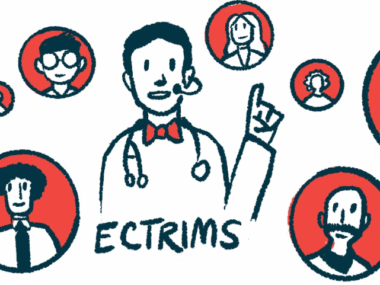AAN 2023: No relapses on Ocrevus for 90% of Black, Hispanic patients
But half of patients in trial still experienced new or worse MS lesions
Written by |

More than 90% of Black and Hispanic patients with multiple sclerosis (MS) treated with Ocrevus (ocrelizumab) in a Phase 4 clinical trial experienced no new relapse activity or sustained disability worsening after nearly one year, according to an interim analysis.
However, more than half of these patients experienced new or enlarging lesions, leading to a large proportion of participants not achieving NEDA, or no evidence of disease activity.
These data “will help us to better understand the disease activity in those two groups, and also the response to treatment,” said Evanthia Bernitsas, MD, professor of neurology and director of the Multiple Sclerosis Center at Wayne State School of Medicine, in Michigan.
Bernitsas discussed the findings at the American Academy of Neurology (AAN) 2023 Annual Meeting, in a presentation titled “An Interim Analysis of Efficacy and Safety Data in Black and Hispanic Patients With Multiple Sclerosis Receiving Ocrelizumab Treatment in the CHIMES Trial.” The work was sponsored by Genentech, a Roche subsidiary, which markets Ocrevus.
CHIMES trial recruited Black and/or Hispanic MS patients
Ocrevus is an approved MS therapy that works by depleting B-cells, a type of inflammatory immune cell with a central role in the autoimmune attack that drives MS. In clinical trials, the therapy was shown to reduce the risk of relapse and disease progression for people with relapsing types of MS.
However, people who are Black or Hispanic have been largely underrepresented in clinical trials of MS treatments like Ocrevus, which have included a disproportionate number of white patients.
Given that Black and Hispanic patients commonly face unique healthcare challenges, taking proactive steps to include more historically underrepresented patient populations in clinical trials has emerged as a pressing need among the research community.
To collect more data on the use of Ocrevus among Black and Hispanic patients, Genentech in 2020 launched a Phase 4 clinical trial called Characterization of Ocrelizumab in Minorities with Multiple Sclerosis, or CHIMES (NCT04377555).
The study was open to MS patients ages 18 to 65 who self-identified as Black and/or Hispanic, and who were able to walk at least short distances unaided. Still underway, CHIMES is being conducted at 30 sites in the continental U.S., as well as one site in Puerto Rico and one in Kenya. A total of 182 people are participating.
All individuals in the study are being treated with Ocrevus according to the approved dosing schedule. It starts with two infusions of 300 mg each, given two weeks apart, then infusions of 600 mg given every six months thereafter.
In the AAN presentation, Bernitsas shared data from 49 patients in CHIMES who had been on Ocrevus for at least 48 weeks, or nearly a year. Among these patients, the average age was 33, and more than 85% were female.
Compared with the population included in the OPERA trials, which supported Ocrevus approval for relapsing forms of MS, these patients tended to be younger and have a higher body mass index or BMI, a ratio of weight to height, Bernitsas noted.
“We know that high BMI increases the risk for MS,” she said, adding that it also may lead to a greater risk of more substantial disability and co-occurring health problems.
More data on Ocrevus for Black and Hispanic patients expected from trial
For patients entering the study, the average time from the first onset of MS symptoms was nearly four years, while the time since receiving a formal diagnosis of relapsing MS was slightly more than 18 months. Disease duration and time to diagnosis was generally shorter among these patients than in the OPERA studies, Bernitsas said.
Results at nearly one year showed 40.8% of patients had no evidence of disease activity — meaning they had no relapses, no disability worsening, and no new disease activity on MRI scans.
The rate of NEDA in this population was smaller than that seen in the OPERA trials, however. There, 48% of participants experienced no evidence of disease activity over the trials’ two-year duration.
Among patients who did experience disease activity, this was usually limited to new activity on MRI scans — more than half of patients in the study developed a new or enlarging disease lesion. New lesions with active inflammation were quite rare however, occurring in just two out of 49 patients (4.1%).
In total, 91.8% of patients had no relapses after almost a year on Ocrevus, and the same proportion had no sustained worsening in their disability levels.
The CHIMES interim analysis provides essential preliminary data for [Ocrevus] treatment response among Black and Hispanic patients.
Side effects of Ocrevus were reported in about three-quarters of patients, and nearly half (44.9%) reported infusion-related reactions that were deemed non-serious. Specifics of these reactions and side effects were not discussed.
Bernitsas noted that the CHIMES study is ongoing, and said further data collected from the trial may provide better information about how Black and Hispanic MS patients tend to tolerate and respond to Ocrevus treatment.
According to the abstract, “The CHIMES interim analysis provides essential preliminary data for [Ocrevus] treatment response among Black and Hispanic patients.”
“The next interim analysis will be in two years,” Bernitsas said.
Note: The Multiple Sclerosis News Today team is providing coverage of the American Academy of Neurology (AAN) 2023 Annual Meeting April 22-27. Go here to see the latest stories from the conference.




